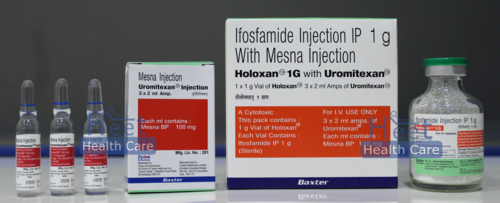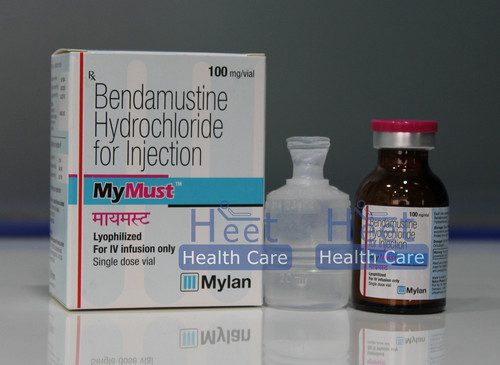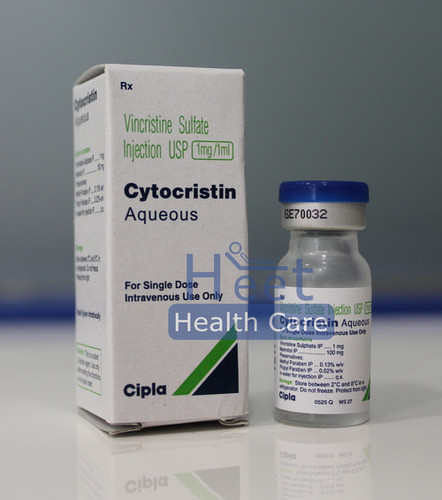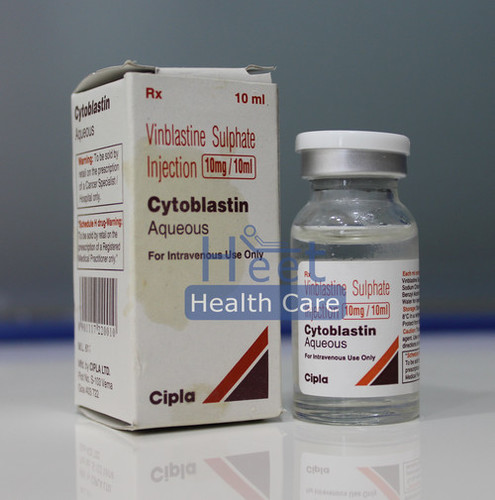Holoxan Ifosfamide 1 gm Mesna Uromitexan
Price 500 INR/ Box
Holoxan Ifosfamide 1 gm Mesna Uromitexan Specification
- Origin
- India
- Dosage Form
- As Per Suggestion
- Feature
- Other
- Ingredients
- Other
- Application
- Other
- Storage Instructions
- Cool & Dry Place
- Shelf Life
- 2 Years
Holoxan Ifosfamide 1 gm Mesna Uromitexan Trade Information
- Minimum Order Quantity
- 1 Bottle
- FOB Port
- Delhi, Mumbai
- Payment Terms
- Paypal, Letter of Credit (L/C), Western Union, Letter of Credit at Sight (Sight L/C), Telegraphic Transfer (T/T), Cash in Advance (CID), Cheque, Cash Advance (CA)
- Supply Ability
- 10000 Bottles Per Month
- Delivery Time
- 7 Days
- Packaging Details
- per box in 1 vial
- Main Export Market(s)
- Australia, Eastern Europe, Middle East, Africa, Central America, South America, Western Europe, Asia, North America
- Main Domestic Market
- All India
About Holoxan Ifosfamide 1 gm Mesna Uromitexan
An anticancer drug called Holoxan (ifosfamide 1 gm) is used to treat different cancers. It functions by preventing the development of cancer cells. Mesna (Uromitexan) is administered simultaneously to lessen any bladder-related side effects that could occur. Mesna aids in defending the bladder lining against harm brought on by the metabolites of ifosfamide. This combination medication is an effective therapeutic choice for some tumours because it increases the effectiveness of ifosfamide while reducing the risk of side effects on the urinary system. As with any drug, thorough physician supervision is necessary throughout the course of treatment.
Two drugs, Holoxan (Ifosfamide 1 gm) and Mesna (Uromitexan), are combined to treat certain malignancies. The characteristics and advantages of this combo therapy are as follows:
Features:
1. Holoxan (Ifosfamide) is an alkylating drug that inhibits the growth and replication of cancer cells, which helps to reduce or halt the progression of tumours.
2. Holoxan is offered in a number of strengths, including 1 gm, which gives healthcare professionals the ability to adjust the dosage to meet the individual needs of each patient.
3. Ifosfamide and Mesna work together synergistically to increase the effectiveness of Ifosfamide while minimising any potential harmful effects on the urinary system.
4. Mesna (Uromitexan), a uroprotective drug, guards against or lessens the bladder toxicity brought on by the metabolites of ifosfamide, such as acrolein.
Benefits:
1. Effective cancer treatment: Ifosfamide and Mesna have demonstrated their efficacy in the treatment of a range of malignancies, including sarcomas, lymphomas, and germ cell tumours.
2. Reduced risk of hemorrhagic cystitis, a typical adverse effect of ifosfamide that can cause bladder irritation and bleeding, is made possible by Mesna's uroprotective function.
3. Reduced incidence and severity of bladder toxicity allows patients to more easily tolerate the medication and maybe finish the entire course of therapy.
4. Improved patient outcomes: When administered correctly under physician supervision, the combination of these medications has helped cancer patients achieve better results and survival rates.
The use of Holoxan (ifosfamide) and Mesna (uromitexan) should only be performed by qualified healthcare providers in a sterile medical environment because they may cause serious adverse effects and necessitate close monitoring. A customised strategy is necessary for the best outcomes because the specific advantages and hazards of this combo therapy will vary depending on the person's medical condition and kind of cancer.
Mesna (Uromitexan) and Holoxan (Ifosfamide 1 gm) are used for:
1. Treatment for cancer: Sarcomas, lymphomas, and germ cell tumours are among the cancers that are treated with Holoxan (ifosfamide) and Mesna. It is frequently used to treat some solid tumours and haematological malignancies.
2. Ifosfamide may be used as a component of the conditioning regimen prior to hematopoietic stem cell transplantation. This helps the body become more receptive to the transplant by suppressing the immune system.
Holoxan (ifosfamide) and Mesna (uromitexan) Side Effects:
1. Antiemetic drugs can be used to treat the nausea and vomiting that these medications may produce.
2. Ifosfamide may cause a reduction in the synthesis of blood cells, increasing the risk of anaemia, infections, and bleeding.
3. Hemorrhagic cystitis: Hemorrhagic cystitis, which results in bladder irritation and bleeding, is one of the serious adverse effects of ifosfamide. Concurrent administration of Mesna lowers this risk.
4. Ifosfamide can have neurological adverse effects including as peripheral neuropathy, disorientation, and vertigo.
5. Rarely, these drugs may cause allergic reactions that result in symptoms including rash, itching, or breathing difficulties.
6. Ifosfamide and Mesna both have the potential to be toxic to the liver and kidneys, raising liver enzyme levels and altering the results of renal function tests.
7. Fatigue: Many people report feeling tired while using these drugs.
8. Ifosfamide can impair fertility in both men and women, either temporarily or permanently.
9. Increased risk of infection: Patients may be more prone to infections as a result of bone marrow suppression.
10. Risk of secondary cancers: Ifosfamide use for a long period of time has been linked to a higher risk of secondary malignancies later in life.
Before beginning therapy, it is crucial to go over any potential side effects with the medical staff. Only under strict medical supervision can these medications be supplied, and patients should be periodically checked for any negative side effects. It is essential to immediately notify the healthcare practitioner if any adverse effects appear so that they can be managed properly.


Price:
- 50
- 100
- 200
- 250
- 500
- 1000+
More Products in Anti Cancer Injection Category
MyMust Bendamustine Hydrochloride 100mg
Price 3500 INR / Box
Minimum Order Quantity : 1 Box
Function : AntiCancer
Storage Instructions : Room Temperature (25 C)
Origin : India
Ingredients : Other
Gemcitabine Injection IP 1gm
Price 1000 INR / Box
Minimum Order Quantity : 1 Box
Function : AntiCancer
Storage Instructions : 2C to 8C cold storage
Origin : India
Ingredients : Other
Cytocristin Vincristine Sulphate 1mg/1ml
Price 170 INR / Box
Minimum Order Quantity : 1 Piece
Function : AntiCancer
Storage Instructions : Cool & Dry Place
Origin : India
Ingredients : Other
Cytoblastin Vinblastine Sulphate 10mg/10ml
Price 250 INR / Box
Minimum Order Quantity : 1 Box
Function : AntiCancer
Storage Instructions : 2C to 8C cold storage
Origin : India
Ingredients : Other
 |
HEET HEALTHCARE PVT. LTD.
All Rights Reserved.(Terms of Use) Developed and Managed by Infocom Network Private Limited. |

 Send Inquiry
Send Inquiry English
English Spanish
Spanish French
French German
German Italian
Italian Chinese (Simplified)
Chinese (Simplified) Japanese
Japanese Korean
Korean Arabic
Arabic Portuguese
Portuguese Send Inquiry
Send Inquiry




